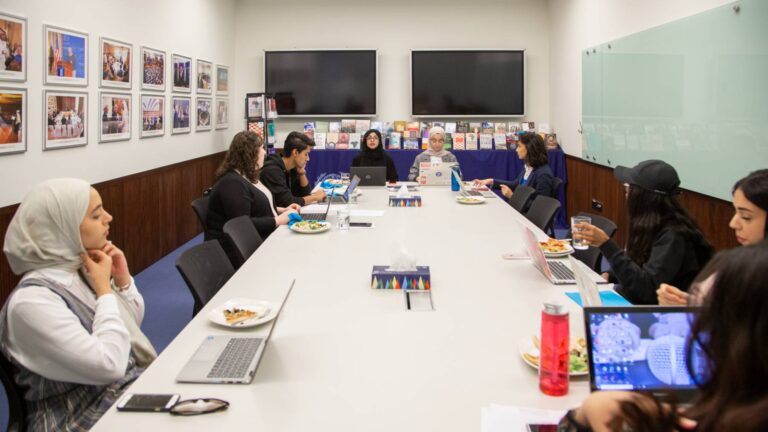American Studies, Regional Studies, Student Engagement
CURA Seminar: Political Economy of the Contemporary Middle East

On September 26, 2019, the Center for International and Regional Studies (CIRS) held a CURA Seminar under its CIRS Undergraduate Research Advancement initiative. During the seminar, CURA Fellows came together for an active discussion of research papers that were submitted to CIRS research initiative on “Political Economy of the Contemporary Middle East.” The papers were critiqued, and the collective feedback was gathered, which was later shared with the research working group. CURA was introduced to support the research needs of undergraduate students at Georgetown University in Qatar, and to provide them with opportunities to enhance their research skills by discussing and analyzing papers from CIRS research initiatives.
Irene Ann Promodh (Class of 2021) opened the CURA seminar by presenting Esfandyar Batmanghelidj’s paper titled “The Ins and Outs of Iranian Industrial Resiliency under Sanctions.” The paper explores Iran’s economic situation and ability to sustain its industrial input under sanctions by analyzing the trade patterns between Iran, China, and Europe through graphical and statistical data. The author discusses the concept of re-export, which focuses on the trade patterns between Iran, Turkey, and the United Arab Emirates (UAE) through which Iran has been able to maintain its supply of European Industrial inputs. The main critique of the paper by the discussants is the structure and lack of explanation of graphs and observed data that describes the trade patterns between Iran and other countries.
Shaza Afifi (Class of 2022) presented Ashraf Mishrif’s paper titled “GCC’s Unsettled Policy for Economic Integration.” Mishrif examines factors explaining the retreat of economic integration in the GCC through the analysis of global and regional challenges. The paper evaluates the strength and capacity of the GCC as a union and explores how the setbacks of the European Union with Brexit, and North American Free Trade Agreement (NAFTA) affected regional economic integration globally. He argues that economic integration, in GCC, is undermined by the slow pace of political integration, lack of a monetary union, and the blockade imposed on Qatar in 2017. The main critique of the paper by the discussants is the lack of in-depth exploration and analysis of the GCC region that affected economic integration.
Following the presentation of each paper, the CURA fellows engaged in an insightful discussion on the structure and organization of the paper, the employed theoretical and conceptual frameworks, and the clarity of the argument. After the discussions, two CURA fellows, AbdulRehmaan Qayyum (Class of 2021) and Khushboo Shah (Class of 2022), served as ambassadors to the “Political Economy of the Contemporary Middle East” working group and shared the comments and critique brought up at the CURA seminar.
- For the participants’ biographies, please click here
Article by Salma Hassabou, CIRS Administrative Fellow